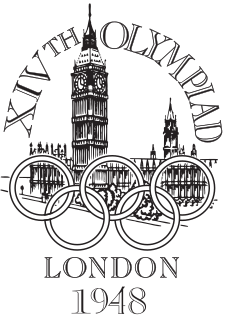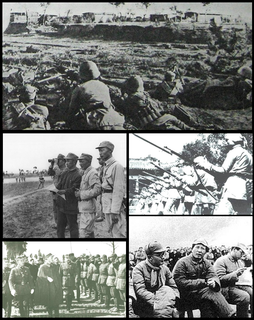
The 1948 Arab–Israeli War was the second and final stage of the 1947–49 Palestine war. It formally began following the end of the British Mandate for Palestine at midnight on 14 May 1948; the Israeli Declaration of Independence had been issued earlier that day, and a military coalition of Arab states entered the territory of British Palestine in the morning of 15 May.

The 1948 United States presidential election was the 41st quadrennial presidential election. It was held on Tuesday, November 2, 1948. Incumbent President Harry S. Truman, the Democratic nominee, defeated Republican Governor Thomas E. Dewey. Truman's victory is considered to be one of the greatest election upsets in American history.

The 1948 Winter Olympics, officially known as the V Olympic Winter Games, was a winter multi-sport event celebrated in 1948 in St. Moritz, Switzerland.

The 1948 Summer Olympics, officially known as the Games of the XIV Olympiad, was an international multi-sport event which was held in London, United Kingdom from 29 July to 14 August 1948.

The Chinese Civil War was a civil war in China fought between the Kuomintang (KMT)-led government of the Republic of China (ROC) and the Communist Party of China (CPC) lasting intermittently between 1927 and 1949. The war is generally divided into two phases with an interlude: from August 1927 to 1937, the KMT-CPC Alliance collapsed during the Northern Expedition, and the Nationalists controlled most of China. From 1937 to 1945, hostilities were put on hold, and the Second United Front fought the Japanese invasion of China with eventual help from the World War II Allies. The civil war resumed with the Japanese defeat, and the CPC gained the upper hand in the final phase of the war from 1945–1949, generally referred to as the Chinese Communist Revolution.

The Federation of Malaya was a federation of what previously had been British Malaya comprising eleven states that existed from 1 February 1948 until 16 September 1963. The Federation became independent on 31 August 1957, and in 1963, Malaysia was formed when the federation united with the Singapore, North Borneo, and Sarawak Crown Colonies.

The 1948 United States Senate elections were elections which coincided with the election of Democratic President Harry S. Truman for a full term. Truman had campaigned against an "obstructionist" Congress that had blocked many of his initiatives, and in addition the U.S. economy recovered from the postwar recession of 1946–47 by election day. Thus Truman was rewarded with a Democratic gain of nine seats in the Senate, enough to give them control of the chamber.

The 1948 United States House of Representatives elections was an election for the United States House of Representatives in 1948 which coincided with President Harry S. Truman's election to a full term. Truman had campaigned against a "do-nothing"' Republican Party Congress that had opposed his initiatives and was seen as counterproductive. The Democratic Party regained control of both the House and Senate in this election. For Democrats, this was their largest gain since 1932. This was the last election to date where a member of a political party other than the Democrats, Republicans or an Independent had one or more seats in the chamber.

The Eightieth United States Congress was a meeting of the legislative branch of the United States federal government, composed of the United States Senate and the United States House of Representatives. It met in Washington, DC from January 3, 1947, to January 3, 1949, during the third and fourth years of Harry Truman's presidency. The apportionment of seats in this House of Representatives was based on the Sixteenth Census of the United States in 1940. Republicans gained a majority in both chambers for this Congress having gained thirteen Senate seats and fifty-seven House seats. Although the 80th Congress passed a total of 906 public bills, President Truman nicknamed it the "Do Nothing Congress" and, during the 1948 election, campaigned as much against it as against his formal opponent, Thomas Dewey. The 80th Congress passed several significant pro-business bills, most famously the Marshall Plan and the Taft–Hartley Act, but it opposed most of Truman's Fair Deal bills. Truman's campaign strategy worked, and the Republicans lost nine Senate seats and seventy-three seats in the House, allowing the Democrats to begin the 81st Congress with twenty-one more seats than they had at the end of the 79th Congress. It also allowed Truman to win a term of his own right as President, having become President after the death of Franklin D. Roosevelt in 1945.

Harry S. Truman was the 33rd president of the United States from 1945 to 1953, succeeding upon the death of Franklin D. Roosevelt after serving as vice president. He implemented the Marshall Plan to rebuild the economy of Western Europe, and established the Truman Doctrine and NATO.
List of Korean films may refer to:
Football at the 1948 Summer Olympics tournament, won by Sweden, managed by Englishman George Raynor.

The 1st Strategic Aerospace Division is an inactive United States Air Force organization. Its last assignment was with Strategic Air Command, assigned to Fifteenth Air Force, being stationed at Vandenberg Air Force Base, California. It was inactivated on 1 September 1991.

The Berlin Blockade was one of the first major international crises of the Cold War. During the multinational occupation of post–World War II Germany, the Soviet Union blocked the Western Allies' railway, road, and canal access to the sectors of Berlin under Western control. The Soviets offered to drop the blockade if the Western Allies withdrew the newly introduced Deutsche Mark from West Berlin.

The 1948 Palestinian exodus, also known as the Nakba, occurred when more than 700,000 Palestinian Arabs — about half of prewar Palestine's Arab population — fled or were expelled from their homes, during the 1948 Palestine war. Between 400 and 600 Palestinian villages were sacked during the war, while urban Palestine was almost entirely extinguished. The term nakba also refers to the period of war itself and events affecting Palestinians from December 1947 to January 1949.

Mandatory Palestine was a geopolitical entity established between 1920 and 1923 in the region of Palestine under the terms of the "Mandate for Palestine".













